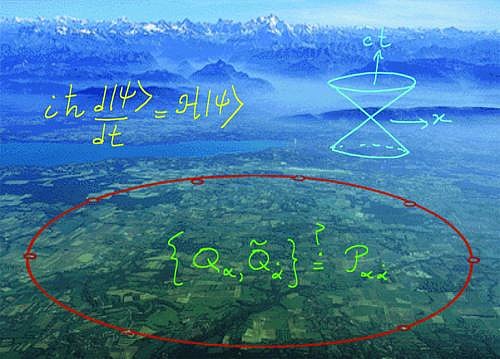Nima Arkani-Hamed to Discuss Space-Time, Quantum Mechanics and the Large Hadron Collider

Nima Arkani-Hamed, Professor in the School of Natural Sciences at the Institute for Advanced Study, will present “Space-Time, Quantum Mechanics and the Large Hadron Collider” on Wednesday, February 23, at 4:30 p.m. in Wolfensohn Hall on the Institute campus.
Arkani-Hamed, one of the leading particle physicists of his generation, will follow the path of fundamental physics from the beginning of the twentieth century, with the twin revolutions of relativity and quantum mechanics, through much of the second half of the century, when physics was devoted to the construction of a theoretical structure unifying these radical ideas. This structure has been confirmed experimentally to exquisite precision over the past three decades.
In this talk, Arkani-Hamed will examine questions that remain: The union of quantum mechanics and gravity strongly suggests that space-time is doomed—but what replaces it? The unification of relativity and quantum mechanics predicts violent short-distance quantum fluctuations that make the existence of a macroscopic world wildly implausible, and yet we comfortably live in a huge universe. What tames these violent fluctuations, and why is there a macroscopic universe? Arkani-Hamed will discuss a spectacular new experiment—the Large Hadron Collider (LHC)—now running and poised to shed significant light on at least some of these mysteries.
Arkani-Hamed’s work is concerned with the whole range of fundamental physics from relation theory to experiment. His research has shown how the extreme weakness of gravity, relative to other forces of nature, might be explained by the existence of extra dimensions of space, and how the structure of comparatively low-energy physics is constrained within the context of string theory. He has taken a lead in proposing new physical theories that can be tested at the LHC.
After earning his undergraduate degree in Mathematics and Physics at the University of Toronto in 1993, Arkani-Hamed obtained a Ph.D. in Physics from the University of California, Berkeley in 1997. He did postdoctoral work at the Stanford Linear Accelerator Center before joining the faculty of the University of California, Berkeley, as Assistant Professor of Physics in 1999. He was named Associate Professor in 2001. Arkani-Hamed spent a year as Visiting Professor of Physics at Harvard University before he joined their faculty in 2002 as Professor of Physics. He was appointed to the Faculty in the School of Natural Sciences at the Institute in 2008.
Arkani-Hamed is the recipient of the Raymond and Beverly Sackler Prize in Physics (2008), a Phi Beta Kappa teaching award from Harvard (2005), the Gribov Medal of the European Physical Society (2003), and a number of fellowships, including a Packard Fellowship and a Sloan Fellowship, both awarded in 2000. He is a Member of the American Academy of Arts and Sciences.
For further information about the lecture, which is free and open to the public, please call (609) 734-8175, or visit the Public Events page on the Institute website, www.ias.edu.
About the Institute for Advanced Study
The Institute for Advanced Study is one of the world’s leading centers for theoretical research and intellectual inquiry. The Institute exists to encourage and support curiosity-driven research in the sciences and humanities—the original, often speculative thinking that produces advances in knowledge that change the way we understand the world. Work at the Institute takes place in four Schools: Historical Studies, Mathematics, Natural Sciences and Social Science. It provides for the mentoring of scholars by a permanent Faculty of approximately 30, and it ensures the freedom to undertake research that will make significant contributions in any of the broad range of fields in the sciences and humanities studied at the Institute.
The Institute, founded in 1930, is a private, independent academic institution located in Princeton, New Jersey. Its more than 6,000 former Members hold positions of intellectual and scientific leadership throughout the academic world. Thirty-three Nobel Laureates and 40 out of 56 Fields Medalists, as well as many winners of the Wolf and MacArthur prizes, have been affiliated with the Institute.